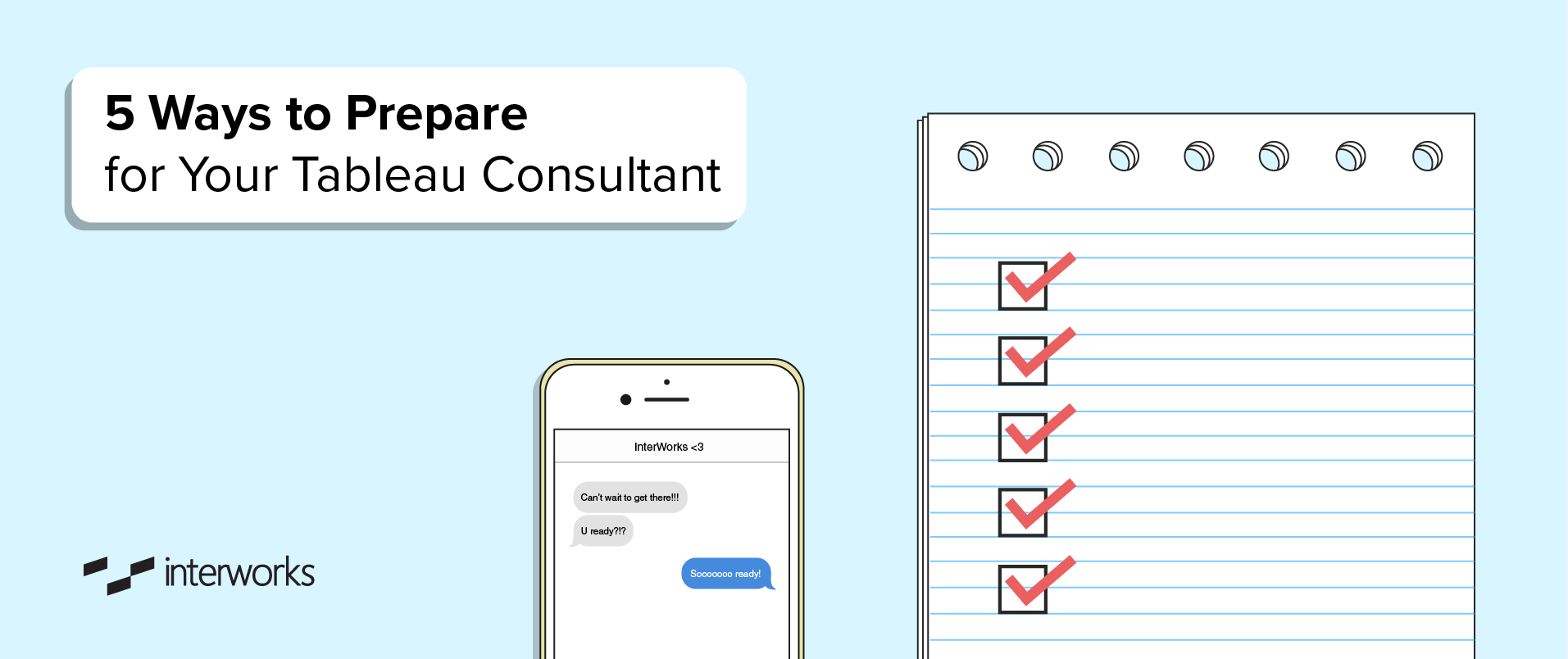
InterWorks is the most awarded and experienced Tableau consultant in North America. We’ve won the Tableau Partner of the Year for three consecutive years and become Tableau’s first Training Partner of the Year back in January. Our business intelligence consultants are working with the largest and most advanced companies in the world. We believe we are the best Tableau consultant in the world, bar none.
There. Now that I’ve sufficiently bragged about us, let’s talk about what makes the best client. There are a lot of variables that can impact the degree of difficulty on a consulting project. Walking a high wire is a tough gig, but if you add in high winds, a fraying wire and driving rain, it’s substantially more difficult to get from point A to B. The same is true with Tableau consulting.
If you’re looking at hiring a Tableau consultant, here are five things you can do to get the very best result with your consultant.
1. Define Your Goals
If I pay an archer to lob an arrow somewhere over in that field, I can’t expect a bullseye. What will happen is that I will walk into the field, find the arrow and then realize where I wanted the arrow to go. Now that I’ve seen what happens, I really wanted the arrow to hit that tree, or that deer, or that target instead. That’s what we experience as Tableau consultants all too frequently.
The more narrowly you can define your goal, i.e. that threshold for project success, the more accurate your Tableau consultants can be in the work they do.
Good goals are concise and action driven. The less ambiguity you have, the sooner your Tableau consultant can start implementing. Clear goals might include:
- Upgrade our deployment to Tableau 10
- Create 10 new dashboards for our executive portal
- Integrate a new database into our data warehouse
- Train 50 team members to be proficient in Tableau Desktop
- Outsource our analytics capabilities
Each of these goals can be measured and tracked.
In the case of a loosely defined goal, such as “get better at analytics,” we’ll have to spend time narrowing down exactly what it will take to be successful. We’ll take the ambiguous goal and break it down into one or more specific goals.
2. Create Documentation
One of the core tasks for implementing the Tableau Drive methodology is documenting your data sources, Tableau best practices and more. Its importance in aiming for amazing results with Tableau almost can’t be overstated. The more you can teach us about your unique systems, setups and interdependencies, the faster our Tableau consultants can start working.
Documentation is normally the lowest level of priority, particularly when it comes to IT. We completely understand that, but a little effort will go a long way. The efforts put into mapping out how everything works will not only help us, it will also integrate new team members faster, identify redundancies of inefficiencies and further the end user adoption of your tools.
If you do not have the time or the bandwidth to document yourself, then make sure you provide time for it within the project. We have developed a ton of tricks to document the data dictionary, the Tableau deployment and more using Tableau itself. We’ve created tools to audit data sources and produce reports in PDF, Tableau and Excel format.
3. Identify the Right People
The success of Tableau lies in the understanding that it is not an IT project. It is a partnership between different groups that ultimately empowers the stakeholders themselves to produce reports and discover analytic insights. For Tableau consulting projects, it makes sense to champion that same spirit of collaboration.
In broad terms, regardless of what goals you’d like us to achieve, your Tableau consultants will need to work with people from the business side, the IT side and the leadership team. This doesn’t mean that there are day-to-day commitments for every single person on that team. Instead, each member of the team will shape the goals of the project and the path to which we arrive at those goals with their unique perspective and needs.
It might help to look again at the Drive methodology. They have very clear roles for the Drive team. Part of preparing for your Tableau consultant is to determine which role will be filled by an internal resource and which role will be assigned to your consultant.
4. Have the Right Mindset
The more you know about Tableau Desktop and Tableau Server, the more we can do for you. The more you understand Tableau’s capabilities, the more of those capabilities you can leverage to positively impact your business through new insights.
When you bring in a Tableau consultant, you’ve got an incredible opportunity not only to achieve some amazing results but also to learn from a genuine expert. Some of our engagements do include classroom training, but whether there is a training aspect or not, use your time with your Tableau consultant to push to the next level of sophistication.
The more closely you put your team in contact with your Tableau consultant, the more they will learn via hands on experience. A truly enterprise-level deployment for Tableau can revolutionize your business. Our Tableau consultants are excited to help you get there, project by project.
5. Prepare for Success
This is often the last question that anyone asks, but what happens if we’re successful? What happens if your Tableau consultants build 10 dashboards and they have such an impact that it’s decided that every business unit needs their own 10?
Preparing for success is an essential part of any Tableau project. The insights that you gather into your business operations will lead to change. That’s the end goal of every project – to improve, to optimize and to advance.
Tableau Consultants On Demand
If you’d like to talk to us about hiring a Tableau consultant to create dashboards, improve your data sources, deploy Tableau Server or even serve as an outsourced analytics team, InterWorks can help.
Contact us today to book your very own business intelligence consultant.

